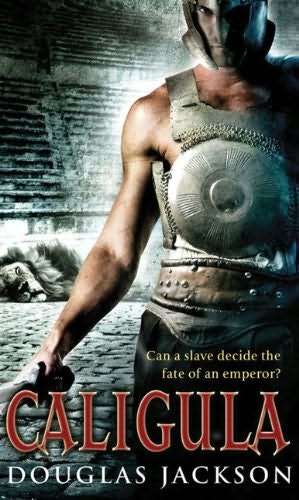Caligula
by Douglas Jackson

Reviewed by Coral
Though a slave, Rufus has known a lucky life. His owner, Fronto, provides animals to be used as entertainment in the games, and intends to free Rufus and make him his heir should he prove himself worthy.
Because of this, Rufus is naďve to the world around him. Though this all ends when, in short succession, his friend, the gladiator Cupido, is dragged away for failing to comply with the wishes of Emperor Caligula during one of his bouts and Rufus himself is forcibly bought from Fronto to become Caligula’s personal elephant trainer. Now his life and the lives of his friends are wholly dependent on the whims of a madman. When opposing factions begin plotting Caligula’s death, Rufus finds himself caught in the middle. Is there a way for Rufus to save himself and his friends without giving in to what is being demanded of them and personally assassinating Caligula? For the most part, I enjoyed this book. I thought it did a good job of capturing the paranoia and fear of an empire ruled by a capricious Caligula. I enjoyed the plot twists (even if some of them near the end were predictable). I liked, or at least felt sympathy towards, a lot of the main characters – by this I mean Rufus and his friends. I thought that the characterization of Caligula effectively captured his brutality and insanity. There were some parts that I didn’t like about the book and they all mainly centered on the sexual relationships that Rufus has with Caligula’s sister, Drusilla, and the one that Caligula has with one of his slaves, Aemilia. In both cases it is made very clear that neither Rufus nor Aemillia are consenting to the encounters. Neither have any choice in the matter, which is also made very clear to them. In this case, both scenes are rape scenes. So, then, when Rufus describes what happens with Drusilla as love making and Caligula is described as Ameilia’s lover, the word choice bothers me. To me, these imply a level of intimacy/romance that can’t be found in these encounters. It bothers me more when Rufus later thinks he may have loved Drusilla, as it comes out of nowhere. I also thought that, as slaves, Rufus, Cupido and Aemilia had a lot more freedom than I would expect. They basically were able to come and go as they pleased, without having to answer to anyone. Aemilia’s initial refusal of Caligula was a little unbelievable for me, in that why would a slave expect that she could refuse something like this? Though, maybe my idea of slavery in Ancient Rome has been influenced by the recent Spartacus TV series, where none of the characters could have really acted as these characters did. Grade: B